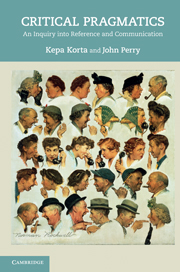Book contents
- Frontmatter
- Contents
- Preface
- Acknowledgments
- 1 Introduction
- 2 A short history of reference
- 3 Acts, roles, and singular reference
- 4 Elements of reference
- 5 Demonstratives
- 6 Context sensitivity and indexicals
- 7 Names
- 8 Definite descriptions
- 9 Implicit reference and unarticulated constituents
- 10 Locutionary content and speech acts
- 11 Reference and implicature
- 12 Semantics, pragmatics, and Critical Pragmatics
- 13 Harnessing information
- 14 Examples
- Bibliography
- Index
11 - Reference and implicature
Published online by Cambridge University Press: 05 March 2013
- Frontmatter
- Contents
- Preface
- Acknowledgments
- 1 Introduction
- 2 A short history of reference
- 3 Acts, roles, and singular reference
- 4 Elements of reference
- 5 Demonstratives
- 6 Context sensitivity and indexicals
- 7 Names
- 8 Definite descriptions
- 9 Implicit reference and unarticulated constituents
- 10 Locutionary content and speech acts
- 11 Reference and implicature
- 12 Semantics, pragmatics, and Critical Pragmatics
- 13 Harnessing information
- 14 Examples
- Bibliography
- Index
Summary
Introduction
Perhaps the most influential theory in pragmatics is still H. P. Grice's account of conversational implicatures [Grice, 1967a, 1967b], which he first developed in the 1960s. The basic picture behind Grice's theory is this. Speakers say various things, in a more or less strict and literal sense of ‘say,’ in virtue of the meanings of words and their modes of composition. But they manage to convey in conversation far more (and sometimes less) than what they say. His examples have become familiar classics, such as the recommendation writer, who by confining himself to positive remarks about handwriting and punctuality, conveys that a student has at best mediocre philosophical talents.
The implicature that the student is mediocre is generated because the writer's intention to convey this information is part of the most plausible explanation of why he said what he said, and didn't say more, in the way that he said it, in the conversational situation. The letter-reader assumes the writer knows about the student's philosophical abilities, and realizes that handwriting and punctuality are almost completely irrelevant. So he asks himself, “Why is the writer supplying no relevant information?” He assumes that if the writer had positive things to say about philosophical abilities, he would do so, and by saying nothing he conveys that he has only negative things to say, which he doesn't want to say explicitly.
- Type
- Chapter
- Information
- Critical PragmaticsAn Inquiry into Reference and Communication, pp. 125 - 138Publisher: Cambridge University PressPrint publication year: 2011



